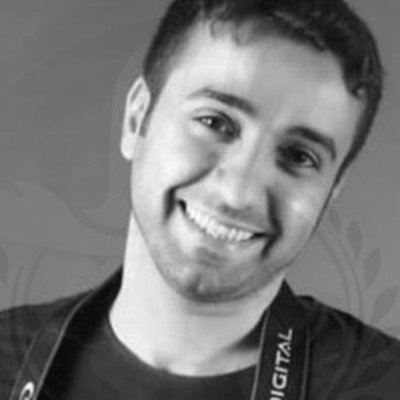
Last Update
June 1, 2020
Organisation
Unknown
Gender
Male
Ethnic Group
Unknown
Religoius Group
Muslim
Province
Khuzestan
Occupation
Journalist
Sentence
Unknown
Status
In prison
Institution investigating
Ministry of Intelligence
Charges
Unknown
Mehdi (Milad) Bahri In prison
Mehdi (Milad) Bahri is a photographer, freelance journalist and cultural activist who was borned in the city of Shadegan in Khuzestan province. In addition to his peaceful cultural and civil society activism, he also has published a number of news articles which focussed on flooding and other problems of displaced people in Khuzestan.
In 2016 and 2017, Bahri was recognized with the Best Photographer Of Khuzestan Province award. He had started his professional career as a photojournalist in 2012 and often published and wrote for the Bereval website.
Bahri was first arrested by security forces at his family home in Fallahieh (Shadegan) on May 15, 2019. He was then transferred to the Ministry Intelligence Bureau of Shadegan.
After three days of interrogation by intelligence officers, Bahri was transferred to the Ministry of Intelligence detention centre of Ahvaz on May 18, 2019.
The reasons for Mehdi Bahri’s arrest were his participation in popular committees which aimed to help provide aid to flood victims and his efforts to help fundraise and collect donations for the flood victims by taking photos and videos of the conditions and difficulties that they faced.
From the time of the floods in Khuzestan in March 2019 until mid-2019, the Ministry of Intelligence and the Revolutionary Guards Corps Intelligence Organization arrested at least 70 civil society activists, volunteer aid workers, poets and teachers from Ahvaz. According to reports concerning these arrests, many of the detainees were subjected to physical torture and mental pressure in order to extract forced confessions from them. These detainees, who were mainly from the Shoaibiyeh region, including the cities of Sushtar, Hamidiyeh, Malashieh and a number of other areas around Ahvaz, were accused of “participating and establishing street protests,” “receiving financial aid from outside of Iran in order to help flood victims” and “spreading rumors about the flood online.”
Mehdi Bahri was transferred to the Sheiban Prison of Ahvaz after having endured 20 days of interrogation in the Ministry of Intelligence Detention Centres in Shadegan and Ahvaz. He later was released on bail on June 24, 2019.
But his freedom did not last long. Mehdi Bahri was arrested for the second time at his home on November 18, 2019, the fourth day of the widespread Aban Protests in Iran, and transferred to an unknown location. It was later revealed that Bahri had again been transferred to Sheiban Prison in Ahvaz by security forces because his family had been unable to secure his bail of 600 million tomans.
On March 24, 2020, the Ahwaz Human Rights Organisation (AHRO) published a statement in which they announced that Mehdi Bahri had contracted coronavirus.
A portion of the report said that “Ahvaz Prison officials have forced all of the infected inmates in the prison’s medical wards to return to the general prison population and now only soldiers infected with coronavirus are being treated and supervised in the prison’s medical wards. This has raised concerns about the spread of Covid-19 among prisoners, especially with the prison holding two political prisoners who were confirmed to have been infected with the virus for several days.”
The Ahwaz Human Rights Organization continued their statement, warning that, “This indifference from prison officials to the principles of preventing the transmission of the virus among prisons endangers the lives of all prisoners and therefore, in order to save the lives of these individuals, all political and non-dangerous prisoners must be released immediately.”
During the pandemic, judicial authorities in the Islamic Republic of Iran temporarily released 83,000 prisoners, out of a total of 280,000 prisoners across Iran. However, AHRO states that, “Thousands of political prisoners and inmates, especially prisoners from the Ahvaz region, have been denied temporary release from prison. This is contrary to the demands of the United Nations and other international organizations which have stated that political and ideological prisoners should have their release prioritized during the Covid-19 outbreak.”
On March 29, 2020, local sources from the Ahwaz Human Rights Organization reported that the condition of a number of patients infected with Coronavirus, including Mehdi Bahri was deteriorating due to the indifference and negligence of officials and guards in prisons in the Shoaibiyeh region of Ahvaz. While Bahri’s condition has deteriorated to the extent that prison officials decided to isolate him to quarantine by himself.
Other reports from the region suggest that officials at the Ahvaz Central Prison have converted Section 2 of the prison into a 100-bed hospital and treatment centre for those infected with coronavirus. Prisoners have protested against this allocation of Section 2 as a facility for treating people infected with coronavirus, however prison officials responded to these protests by stationing a special riot police unit in the Ahvaz Central Prison to suppress the prisoners.
Prison officials are also said to have refused to cooperate with the prisoners or provide any form of assistance in order to prevent the spread of the disease in the prison. They have even refused to conduct testing of any individuals in order to identify who among the prison population has been infected.
On March 31, 2020, a series of videos were released that were filmed nearby the Sheiban Prison in Ahvaz, which showed smoke rising over the prison grounds as well as the sound of gunfire coming from within the prison compound. The Human Rights in Iran organization posted on its Telegram channel reporting that these prison protests were due to “prisoners being denied access to sanitary items and disinfectants” to fight against the spread of coronavirus and also the denial of their “right to temporary leave and other civil rights.”